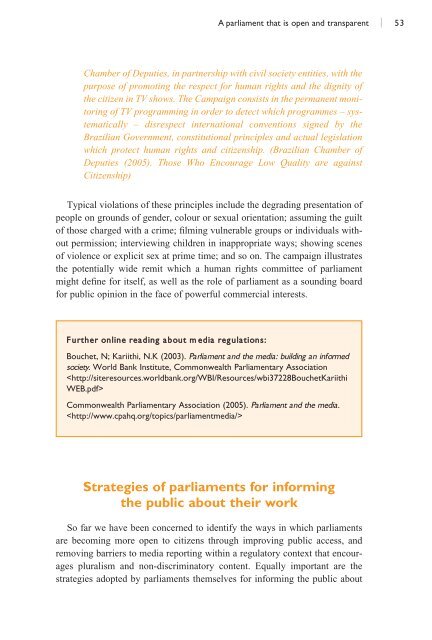PARLIAMENT AND DEMOCRACY - Inter-Parliamentary Union
PARLIAMENT AND DEMOCRACY - Inter-Parliamentary Union
PARLIAMENT AND DEMOCRACY - Inter-Parliamentary Union
Create successful ePaper yourself
Turn your PDF publications into a flip-book with our unique Google optimized e-Paper software.
A parliament that is open and transparent I 53<br />
Chamber of Deputies, in partnership with civil society entities, with the<br />
purpose of promoting the respect for human rights and the dignity of<br />
the citizen in TV shows. The Campaign consists in the permanent monitoring<br />
of TV programming in order to detect which programmes – systematically<br />
– disrespect international conventions signed by the<br />
Brazilian Government, constitutional principles and actual legislation<br />
which protect human rights and citizenship. (Brazilian Chamber of<br />
Deputies (2005). Those Who Encourage Low Quality are against<br />
Citizenship)<br />
Typical violations of these principles include the degrading presentation of<br />
people on grounds of gender, colour or sexual orientation; assuming the guilt<br />
of those charged with a crime; filming vulnerable groups or individuals without<br />
permission; interviewing children in inappropriate ways; showing scenes<br />
of violence or explicit sex at prime time; and so on. The campaign illustrates<br />
the potentially wide remit which a human rights committee of parliament<br />
might define for itself, as well as the role of parliament as a sounding board<br />
for public opinion in the face of powerful commercial interests.<br />
Further online reading about m edia regulations:<br />
Bouchet, N; Kariithi, N.K (2003). Parliament and the media: building an informed<br />
society. World Bank Institute, Commonwealth <strong>Parliamentary</strong> Association<br />
<br />
Commonwealth <strong>Parliamentary</strong> Association (2005). Parliament and the media.<br />
<br />
Strategies of parliaments for informing<br />
the public about their work<br />
So far we have been concerned to identify the ways in which parliaments<br />
are becoming more open to citizens through improving public access, and<br />
removing barriers to media reporting within a regulatory context that encourages<br />
pluralism and non-discriminatory content. Equally important are the<br />
strategies adopted by parliaments themselves for informing the public about

















